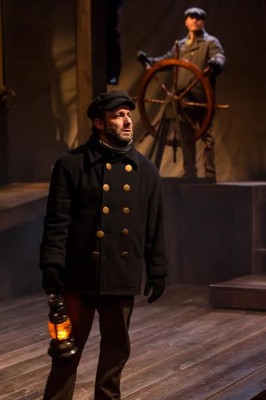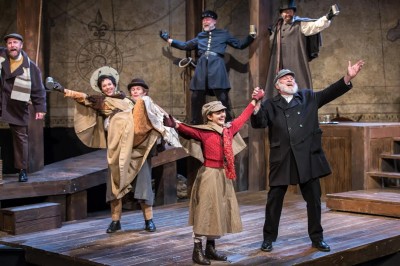The Christmas Schooner (2014)
Music and Lyrics by Julie Shannon
Directed by L. Walter Stearns
Musical direction by Eugene Dizon
Produced by Mercury Theater Chicago.
New Cast Keeps Christmas Schooner Sailing
Performances of local artist John Reeger and the late Julie Shannon’s The Christmas Schooner are a long-standing Chicago tradition, having run at Bailiwick Repertory Theatre from 1995-2007, and at Mercury since 2011. This year is different, however, because several cast members are new. Since I am also new to this tradition, I’ll treat it like a new production.
Though The Christmas Schooner is only loosely based on history, it is grounded in the historical significance of Christmas trees and immigrant experiences. Set in the late nineteenth century, it depicts the Stossel family of Manistique in Michigan’s Upper Peninsula. Gustav (James Wilson Sherman) and his son Peter (Stef Tovar) are naturalized citizens of German origin. Peter’s wife, Alma (Brianna Borger) was born in Switzerland, and they have a son, Karl who is played by William Anderson at nine and Brian Bohr at fifteen. Peter is a successful schooner captain, and generally tries to avoid the arguments between his wife and father over how much they should assimilate into American culture. Alma does not even want Gustav to speak German in the house. But she does enjoy the presence of a tannenbaum, a fir tree, which Germans traditionally decorated in the winter.
One day the Stossels receive a letter from their cousin Martha (Kelly Anne Clark), living in Chicago, who expresses longing for a tannenbaum of her own. Peter resolves to make a dangerous November shipment of evergreen trees to Chicago, so the German community there can celebrate Christmas. Alma is deeply upset by his decision to risk his life, but upon arrival Peter and Gustav are so overwhelmed by the immigrants’ gratitude they decide to make the shipments an annual practice. As he grows into a teenager, Karl insists on joining his father on a fateful voyage.
The story works in part because of several early scenes, such as when Gustav tells a legend about the Christ child and the song “The Blessings of the Branch,” which establish that these characters regard the tree as an integral part of a religious observance, not just decoration. (Shannon claimed to have invented the particular practice of passing the branch, but it’s based on German folklore.) Peter’s decision to sail and the Chicago Germans’ gratitude make much more sense in that context. Reeger and Shannon also took care in their book to flesh out the Stossel family’s lives while weaving them into a broader immigrant society. There are many instances in which the company forms a chorus to comment on Alma’s anxiety and exhaustion from the endless work running an economically vibrant household, and the pressure of Peter’s responsibility to his sailors and dependents.
The songs are always pleasant and contribute to the story’s emotional weight, especially “What is it About the Water?” Partly because so few songs are by just one character, there was never a moment in which I was particularly amazed by any one actor’s rendition. But taken as a whole, the performers and songs create a graceful and moving production, though they will need to speak louder over all the audience members coughing from the fog machines. Sherman, one of the few veteran cast members, is excellent as Gustav. He’s funny, but his values are understandable. Borger’s Alma is sympathetic, never shrill, and responsible for the feeling of warmth coming from the Stossel household. Anderson is a delightful child actor, and Bohr conveys earnestness. Brenda Didier’s choreography contains some surprises, and Jacqueline and Richard Renrod’s scenic design, which bisects the stage into Alma’s house and Peter’s schooner, becomes a playground for the grown-ups as well as the kids.
The Christmas Schooner’s story isn’t so much “heart-warming” as it is poignant. The company’s promotional materials reveal that the boat sank with heavy loss of life, and the play’s final conflict is over whether the remaining characters should continue their risky enterprise. It’s a grimly determined sort of good cheer the story promotes, but that is why the story is important to tell. Generosity and good-will never come easily when they require real sacrifice, but this holiday story examines the spirit which compels people to do so anyway.
Recommended
Jacob Davis
[email protected]
Reviewed December 3, 2014
For more information, see The Christmas Schooner’s page at Theatre in Chicago.
Playing at Mercury Theater Chicago, 3745 North Southport Avenue, Chicago. For tickets, call 773-325-1700 or visit www.MercuryTheaterChicao.com. Tickets are $25-65. Runs through December 28. Performances are Wednesday at 7:30 pm, Thursdays at 3:00 and 7:30 pm, Fridays at 8:00 pm, Saturdays at 3:00 pm and 8:00 pm, and Sundays at 3:00 pm and 7:30 pm. Running time is two hours, fifteen minutes with one intermission.




